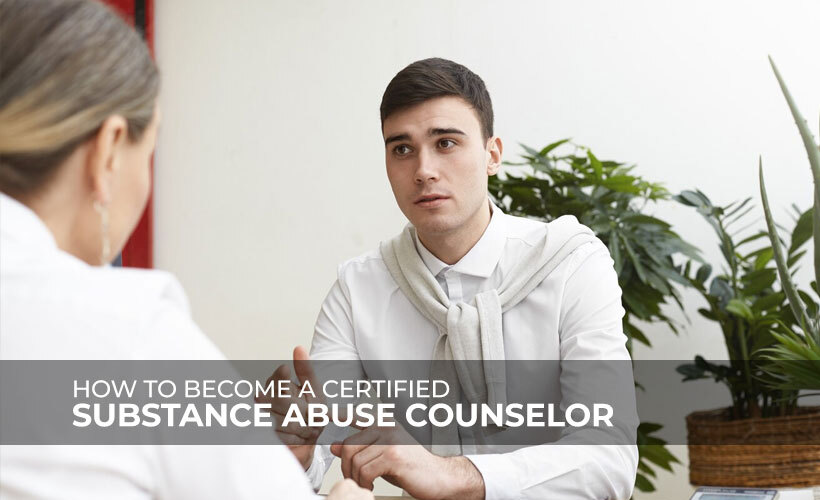Substance abuse is a common yet major problem in the United States. Many people struggle with addiction, and the need for trained counselors is growing. If you want to help others improve their lives, becoming a certified substance abuse counselor might be a great choice. Moreover, this job lets you guide people through recovery and help them overcome their addiction.
In this article, we will explain the steps to becoming a certified substance abuse counselor. We will show you how to gain the skills and qualifications needed. With these, you can make a real difference in the lives of others.
What is a Substance Abuse Counselor?
A substance abuse counselor helps people who are dealing with addiction. This can include alcohol, drugs, or other harmful substances. They provide therapy and emotional support. They also offer guidance to help patients understand their struggles. The goal is to help them work toward recovery.
Counselors work in different places. They may work in rehabilitation centers, private practices, hospitals, or community organizations. In these settings, they offer care and support to people facing addiction.
Substance abuse counselors are very important. They guide people through tough times. They also help people build healthier lives on their recovery journey.
Steps to Become a Certified Substance Abuse Counselor
This section provides a step-by-step guide to becoming a certified SAC in the US.
Step 1: Understand the Role and Requirements
Before starting, it’s important to understand the role of a substance abuse counselor. These professionals help people overcome addiction. They work to improve their clients’ lives. They offer counseling and create treatment plans to guide clients toward recovery. Counselors also conduct assessments to evaluate what the clients need. Sometimes, they may handle crisis situations during emergencies.
Each state in the US has its own rules for certification. You need to learn what education, certifications, and training are required in the state where you want to work. Knowing these details early will help you plan your journey the right way.
Step 2: Pursue a Relevant Education
The first step is to obtain the proper education. Most counselors need at least a bachelor’s degree in fields like psychology, social work, or a similar area. Some states may require a master’s degree. So, it’s necessary to check the requirements of states. Researching your career goals will help you choose the best path.
Many universities and colleges offer programs in substance abuse counseling. These programs are designed for students who want to help people with addiction. Furthermore, choosing a program that fits your goals is a key step forward.
Step 3: Gain Hands-On Experience
Experience is key to becoming a SAC. Most certification programs require supervised clinical hours. You can gain these hours through internships, practicums, or volunteer work at treatment centers for rehab facilities.
These experiences allow you to work directly with patients and apply the skills learned in your coursework. This hands-on practice builds confidence and prepares you for your future role.
Step 4: Obtain Certification
After completing your education and gaining clinical experience, the next step is certification. Certification is necessary to start your career. Different states and career goals require different certifications. Common ones include:
- Certified Alcohol and Drug Counselor (CADC)
- National Certified Addiction Counselor (NCAC)
- Licensed Professional Counselor (LPC)
Each certification has specific requirements, such as passing an exam or completing a set number of experience hours.
Step 5: Continuing Education and Professional Development
After getting certified, your learning doesn’t stop. In order to maintain your certification, you may need additional education, such as workshops or training sessions. These activities help you stay updated with the latest practices and methods in the field.
Continuing education ensures you remain prepared to help others effectively. Moreover, this also supports your growth and success in this career.
Key Skills of a Substance Abuse Counselor
To succeed as SAC, you need certain skills to work effectively with people in need.
Here are the most important ones:
- Empathy and Compassion
You will work with people facing tough times. Many are vulnerable and need support. Understanding their feelings and showing care helps you connect with them. - Communication Skills
Clear communication is key. You need to explain treatment plans in a way that makes sense. Listening carefully also builds trust with your clients. - Problem-Solving
Every recovery journey is different. Challenges will arise that require creative solutions. Finding new ways to help clients is an essential part of your role. - Patience and Persistence
Recovery takes time, and progress may be slow. You need to stay patient and continue supporting your clients, even during setbacks.
By developing these skills, you can make a positive impact on those who need your help.
Challenges and Rewards of Being SAC
Being a SAC is a fulfilling career, but it comes with unique challenges. The work requires resilience, emotional strength, and dedication. Helping others overcome addiction is rewarding, but not always easy.
Challenges
-
Dealing with Resistance:
Many individuals may resist counseling due to denial, fear, or being unready for change. Counselors must handle this resistance using techniques like motivational interviewing. This will build trust and encourage engagement.
-
Relapse and Setbacks:
Recovery from addiction is rarely a straight path. Relapse is common and can be discouraging for both clients and counselors. Patience and empathy are needed to help clients get back on track.
-
Emotional Toll:
Working with people struggling with addiction can take an emotional toll. Counselors hear painful stories that can lead to burnout or compassion fatigue.
-
Long Hours and Stressful Situations:
Counselors often work long hours, especially in rehab centers or emergency rooms. High-pressure, fast-paced environments can add stress, and being on call adds to the demands.
Rewards
Becoming SAC can be challenging, but it is also very rewarding.
Here are some key rewards:
-
Making a Positive Impact:
The biggest reward is knowing you are helping others overcome addiction and rebuild their lives. Seeing someone improve and regain hope is truly special.
-
Career Growth and Stability:
The demand for addiction counseling is increasing, providing job security and many opportunities for career advancement. Counselors can take on new responsibilities and grow within the field.
-
Personal Satisfaction:
Counselors often feel deeply satisfied by the difference they make. Helping clients stay sober and recover brings a sense of accomplishment, especially when seeing long-term recovery.
-
Opportunity for Specialization:
Substance abuse counselors can choose to specialize, whether in working with teens, veterans, or treating specific addictions like alcohol or opioids. Specializing can enhance skills, open new doors, and lead to higher earnings.
In short, despite the challenges, being SAC offers a rewarding career with opportunities for growth, personal satisfaction, and specialization.
Salary Expectations for Substance Abuse Counselors
The salary for substance abuse counselors varies depending on experience, location, education, and work setting. Overall, the pay is competitive, with opportunities for growth.
Average Salary
According to the U.S. Bureau of Labor Statistics, the average salary for a substance abuse counselor was $47,660 per year in May 2021. However, salaries depend on several factors:
- Entry-Level Counselors: $36,000 to $42,000 per year.
- Experienced Counselors: $50,000 to $65,000, with higher pay for those with advanced certifications or special training.
Geographical Differences
Location plays a big role in salary. Counselors in large cities like New York City or Los Angeles can earn over $70,000. While those in rural areas may earn less but have a lower cost of living.
Salary by Work Setting
Work environment affects pay as well. Counselors in private practices or hospitals tend to earn more than those in community clinics or rehabilitation centers.
Chances for Advancement
As counselors gain experience and certifications, they can move into higher-paying roles. The roles assigned are clinical supervisors or program directors. These positions typically offer salaries from $70,000 to $90,000 or more.
Career Outlook for SAC in the US
The need for substance abuse counselors (SAC) in the U.S. is growing quickly. This is due to the ongoing opioid crisis and rising substance abuse rates. Additionally, there is also a growing awareness of addiction as a medical issue. These changes are boosting the demand for counselors. It’s a great time to start a career in addiction counseling.
Growing Demand
The U.S. Bureau of Labor Statistics reports that the need for SAC will grow by 23% from 2020 to 2030. This is much faster than other professions. In rural areas, the demand is especially high. These areas lack enough addiction services. As more people seek help for addiction and mental health issues, the need for counselors will keep growing.
Specialized Roles
Counselors can work in special areas. They can help people who have both substance abuse and mental health issues. Counselors can also work with veterans. Additionally, they can support people in the criminal justice system. These roles provide many chances to assist those who need help the most.
Opportunities in Telehealth
Telehealth has grown quickly, especially after the COVID-19 pandemic. More counselors are offering th-erapy online. This allows patients to get help from home. Further, this makes it easier for people to access care.
This trend creates new chances for counselors. They can provide addiction therapy online. Now, people can receive the help they need from the comfort of their homes.
For those looking to explore more about healthy dining, Revolution in Healthy Dining is a great read that delves into modern trends in nutrition and wellness-focused cuisine.
Conclusion: Start Your Journey Today
Becoming a certified substance abuse counselor allows you to help people. You can make a big difference in their lives while building a stable and rewarding career. The journey may take time and hard work. However, the personal satisfaction and job stability make it a great choice.
The field offers many opportunities. You can work in community centers, hospitals, or even through telehealth. Furthermore, there are many chances to help people beat addiction.
Are you ready to take the next step? Explore your educational and certification options, gain hands-on experience, and start making a difference today.
For more details on starting your journey, visit My Choice Health Services.


